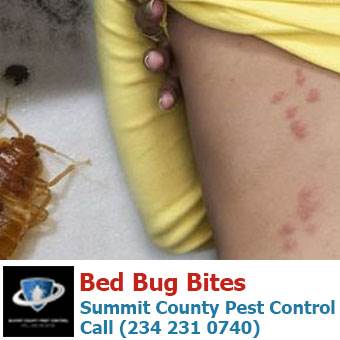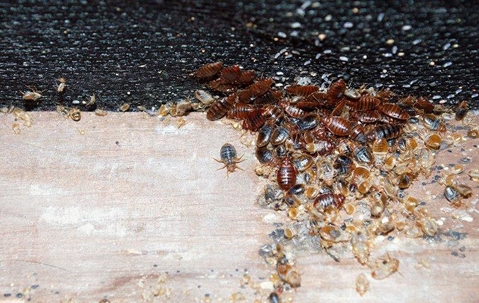Bed Bug Exterminator Houston LLC: Trusted Solutions for Bed Bug Infestations
Efficient Parasite Control Measures to Shield Your Yard and Plants
In the realm of horticulture, the harmony of a well-tended garden can commonly be disrupted by unwanted pests that intimidate the health and wellness and vitality of plants. As gardeners strive to preserve a growing outside space, the difficulty of parasite control becomes a vital facet of their gardening undertakings. Implementing reliable bug control measures not just safeguards the yard's aesthetic appeal however likewise plays an essential role in preserving the plants' wellness. By discovering an array of techniques that encompass natural repellents, valuable bugs, friend planting, do it yourself options, and environmentally-friendly chemicals, garden enthusiasts can browse the intricate world of pest administration with precision and care.
All-natural Bug Repellents

One more efficient all-natural pest repellent is diatomaceous earth, a grainy compound made from fossilized aquatic microorganisms. Diatomaceous planet works by physically harming bugs with its unpleasant texture, making it an outstanding choice for managing bugs like slugs, beetles, and caterpillars. In addition, growing companion plants like marigolds, lavender, or basil can aid drive away pests as a result of their strong aromas or natural chemical compounds.
Beneficial Pest for Parasite Control

One more advantageous bug is the parasitical wasp, which lays its eggs inside bug bugs, ultimately killing them. Ground beetles are excellent for controlling caterpillars, snails, and slugs. Hoverflies, typically mistaken for as a result of their comparable appearance, feed on aphids, thrips, and caterpillars.
To attract useful bugs to your garden, you can plant a varied variety of blooming plants, such as dill, fennel, and yarrow, which supply nectar and pollen for grown-up bugs. In addition, avoid using broad-spectrum pesticides that can damage both dangerous and beneficial insects. By creating a welcoming environment for these helpful pests, you can minimize the requirement for chemical pesticides and promote a much healthier, extra balanced yard environment.
Buddy Planting Techniques
When aiming to improve the efficiency of helpful bugs in your garden for natural bug control, considering companion growing methods can further optimize the community equilibrium. Buddy planting entails purposefully putting specific plants beside each other to maximize their common advantages, such as discouraging parasites, attracting beneficial bugs, or enhancing vitamins and mineral uptake - bed bug exterminator houston near me. One preferred instance is growing marigolds together with tomatoes to drive away nematodes and various other dangerous bugs while additionally attracting pollinators
In addition, incorporating aromatic herbs like basil, mint, or rosemary in between veggie rows can aid prevent pests with their solid aromas. Another efficient method is growing flowers such as sunflowers, zinnias, or cosmos to attract pollinators like and butterflies, which in turn can aid in cross-pollinating your fruit and veggie crops. Additionally, planting catch plants like nasturtiums can draw away bugs far from your major plants, acting as sacrificial plants that shield your useful produce. By executing friend planting techniques, you can produce a diverse and harmonious yard community that normally manages bugs while promoting plant health and wellness and performance.
DIY Insect Control Solutions
To successfully manage insects in your garden, executing diy pest control solutions can be an affordable and ecologically friendly technique - bed bug exterminator houston near me. Establishing up physical obstacles like row covers or netting can additionally avoid parasites like caterpillars from harming your plants.
Another reliable method is making use of diatomaceous earth, a natural powder that can be sprinkled around plants to deter slugs, snails, and other crawling insects. Friend growing certain herbs and flowers like marigolds, basil, and lavender can assist repel bugs and bring in advantageous pests. Frequently examining your plants for signs of bug damages and promptly eliminating any kind of affected locations can likewise protect against infestations from spreading. By integrating these do it yourself parasite control services right into your gardening regimen, you can shield your yard and plants without counting on rough chemicals.
Environmentally-Friendly Pesticides

An additional effective option is diatomaceous earth, an all-natural compound made from fossilized aquatic organisms, which can be sprayed around plants to manage slugs, snails, and other creeping pests. In addition, insecticidal soaps and oils stemmed from plant-based sources serve for managing soft-bodied parasites like aphids, termites, and whiteflies.
Verdict
To conclude, effective pest control steps such as all-natural repellents, useful insects, friend planting strategies, do it yourself remedies, and environmentally-friendly chemicals are crucial for safeguarding your garden and plants. By carrying out these methods, you can prevent damage caused by bugs and maintain a healthy and balanced and thriving yard community. It is vital to take into consideration the long-term effect of utilizing chemicals and go with even more lasting and environmentally friendly choices to guarantee the health and well-being of your plants and the environment.